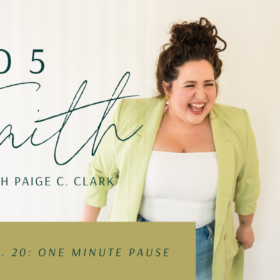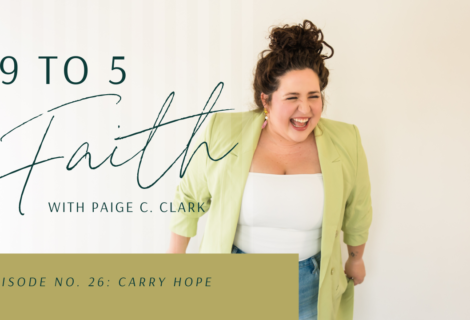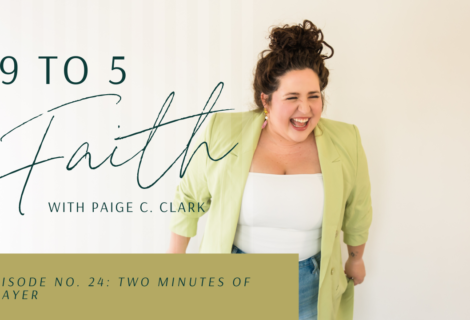This is a transcript from episode 19 of the 9 to 5 Faith Podcast with Paige C. Clark.
Share on Social




Start of Podcast
Paige C. Clark 0:42
Hello, hello, everyone. I am here with my great friend, Cindy. Cindy, how are you doing?
Cyndi Staudt 0:51
I’m great. Good. Yeah,
Paige C. Clark 0:53
I’m so happy to have you. And I also like love the little things behind your head, like this picture from your book. And then also, like, this amazing little tote that we have that says your words matter is so great. Reminder, I
Cyndi Staudt 1:09
like to look at that every day. Yes, I
Paige C. Clark 1:11
actually have it on my like, on my Yeti. That’s awesome. My little your words matter sticker. So all good things. Can you introduce yourself a little bit to us?
Cyndi Staudt 1:22
Yes, my name is Cindy Stout. And I am a recently self-published author of a process in progress. Yeah, it’s nice to kind of see that all come to completion after all the work. Yeah. I, I do a lot of different things. Workwise, which I think we’re going to get into, I read, I say I retired a year and a half ago from what was my full-time career as a wellness coordinator to just pursue things that I’m passionate about. Yeah, and it’s just been awesome to see how God has kind of taken that and made sure that I’m financially covered and just continues to provide in so many ways. So
Paige C. Clark 2:06
that’s what’s so awesome. So tell us a little bit about the book. I know about it, but tell our listeners to share it.
Cyndi Staudt 2:16
So the book, like, I said, is called Princess in Progress. And it is about pursuing and proclaiming your identity in Christ. And it’s really the journey that I personally went on after my second divorce. And realizing I just had no clue who I was, I looked in the mirror and didn’t recognize the person. And God took me on a journey of searching the scriptures and seeing what he says about me. But then he had me write all these verses out into a biblical affirmation. And he told me I needed to say them to myself in the mirror every day until I believed them. And so that’s kind of the journey; I take people on just some of the things that I discovered during that journey. And I encourage them to do the same.
Paige C. Clark 3:02
That’s awesome. And how long have you been working on it?
Cyndi Staudt 3:05
Oh, gosh, it from start to finish? It probably about three years it took. Wow.
Paige C. Clark 3:09
Yeah. So just recently retired, meaning you are also writing and working on this while you’re also working?
Cyndi Staudt 3:17
Absolutely. Yeah.
Paige C. Clark 3:19
Tell me. Yeah. Tell us a little bit about that.
Cyndi Staudt 3:22
Yeah, so I started working on it probably about nine months before COVID happened. And as I was coming into the end of 2019, I was just praying and probably grumbling a little bit to God, like, I don’t have time, I have no time to write a book. And. And so then he coming into 2020, he was like, I want you to cancel your cable, your spare, you know, my Spectrum cable, he’s like, cancel that. So you have some time. I’m like, Okay, and so I did that and still wasn’t really making any progress. And I was just like, I’m just too busy thought I’m just too busy. And then COVID happen. And so I was working as a wellness coordinator for a large hospital system here in the Orlando area. And they had this; they called it redeployment during COVID. And so you sign an agreement, and they will pay you your normal pay. And you agree that if they need you somewhere else in this hospital system, within two days of them contacting you, you will go and work wherever they asked you to go work. I was like, Sure. So I mean, I’m a wellness coordinator. I’m not clinical. I’m not a nurse. There are not a whole lot of places they can use me, right? So I’m getting paid my normal pay, not having to work, and still not making progress in my book. I’m like, Okay, let’s look in the mirror and see. Oh, yeah, who was the problem here? It was really an interesting time with God and me, and it just hit me very tenderly, showing To me like, Okay, we have to make a plan to make this happen.
Paige C. Clark 5:03
Yeah. Yeah. And that’s, like, really beautiful, too, because that’s God showing up and affirming what you were already working on. Right? Because, like, he allowed and made for those things to happen in the place, right? Like the resistance, no offense was within you. Exactly. Yes. And then God showed up. Right? Like,
Cyndi Staudt 5:37
like, I don’t have anyone else to blame anymore because it was, like, I was too busy with work. And then he took that, you know, and I’m like, at nighttime, I have to do all the things at home and then realize, Wow, I do spend a lot of time, like, even if I’m folding laundry watching TV, it’s like slow because I’m paying attention to the TV shows that away. And then oh, well, I’m, you know, I have all these things to do after work and, and then actually getting paid and not having to work. I was like, Oh, my, I don’t have any excuses. I have a lot of time, and I’m still not really making progress. So it was really good. to kind of get that settled.
Paige C. Clark 6:13
Yeah, I think I think as difficult as the past two and a half years have been for people, I think it was also kind of own an awakening for a lot of other people in, in so many different ways. For me, it was like a lot of about, like, being self-sustainable. And like, like, I got my garden going and like doing those things of just kind of getting back in touch with my roots. And then for other people like yourself, it was like, No, this is a time of freedom for you.
Cyndi Staudt 6:45
Yeah, and it really made me when I, when I went back to work, you know when they called us back. I only had to go into the office two days a week where I had to be there five days a week prior, but I realized, you know, I I really enjoy working from home, like, I wasn’t sure I would, but I was like, I really enjoy it. And once I got that sorted out with God, I realized I could be really productive. And when I need to, I can; I can leave home and go to a coffee shop or somewhere to work and get a change of scenery. And so I think that was just like the beginning of me realizing, like, I’m gonna be okay if I leave my job. Like, there are a lot of things I thought I needed from that job that I did.
Paige C. Clark 7:26
Yeah, yeah, for sure. And I think too, then when I talked to people, I say, they asked like, Oh, what do you do? And I’m like, hey, well, what answer do you want me to do? Oh, a lot. Oh, like, I can go down the list. Or I can give you the answer. You’re kind of expecting I can do either one. All right.
Cyndi Staudt 7:48
That’s me too.
Paige C. Clark 7:49
So tell me a little bit about your journey at work. And I also, like, I realize with all these conversations that I have on the podcast. I also like need to ask, like, Where Where did work fit in in terms of your faith journey? Meaning like, Did you come to Christ? And in this new workplace, have you always been a Christian in this workplace? Or what have you? What did that whole kind of landscape look like?
Cyndi Staudt 8:20
Right? I did find, like, I was brought up in Church, but I had no concept of really having, like, a personal relationship with Jesus until much later in life. And so I was saved before I started that job at the hospital. And it was interesting because going into that space and realizing, like not everybody is, right. And, and not everybody’s necessarily even receptive to you talking about it, or, you know, we’re having a company lunch, and I, I don’t ask everybody to pray with me, but I pray and realize that it makes people uncomfortable. So it was interesting to navigate that into; it’s really important to me that when people see me like that’s one of the first things they think of, oh, she’s a Christian, like she’s an authentic practicing, trying to walk the walk, which is the name of my ministry, someone that’s really trying to live out their faith. And I want people to know that, and so to be able to figure a way to make that known or in an atmosphere where maybe people are trying to keep that squashed a little bit, so yeah,
Paige C. Clark 9:37
and tell me like and educate me. I would tend to think that when like you’re you’re working in the medical field, you’re in hospitals to write. You said that, right? Yes. With hospitals. I would say faith is a little bit more appropriate in that setting. And correct me if I’m wrong. That’s like, that’s my stereotypical brain.
Cyndi Staudt 10:04
But I think that people these days are so worried about offending people. Hmm. Right. And so in organizations like that it, you know, large organizations, they’re, you know, they’re very concerned with making sure that everybody’s equally represented. And you know that we’re not showing favoritism one way or another. And so I think they’re just a little bit more sensitive to things like that. Which, you know, I understand, I guess, like, that’s the law and sunrise like they have to make sure that but like I said, like, it was really important to me to make sure that, you know, if somebody talks about Cindy, the number one thing they should mention is her face. So that’s because that wasn’t that way. Like, I have a history of drug abuse and drug addiction; I actually overdosed three times and woke up twice in the emergency room with the same emergency room nurse. And so, like, I was known for being one way. And now and I wanted to make sure that people not only saw the change but knew why there was; there was a moment when God, after I had gotten saved, I was a manager of a gym, and one of my employees came in to work on her day off, and she was sitting in the office and just kind of slumped in her chair. And it was like, What are you doing here? Why are you here on your day off, she started talking about some issues she was having at home, and she said, you know, you wouldn’t understand you’ve got your life altogether. And God, like, really convicted me at that moment. Like, you have to let people know, you know, where I brought you from, and that it was me that did it, and that I can do it. So
Paige C. Clark 11:48
that’s that. Yeah, that’s beautiful. And I think, too, that’s maybe one of the buckets that Christians kind of get put in is, is, you know, you have your whole life to get. I’ve lost friends over that before of people who think that my life looks perfect and ideal, and, you know, what have you and of course, you know, social, but it was a close friend, it was a close friend of mine and our friendship suffered because that was her impression of me when really that’s not true. For those listening. Cindy and I were just talking about how my husband is recovering from an operation to remove a cancer tumor. So I promise you life’s not perfect here. But yeah, that is a struggle. And I think to do that; I always struggle with allowing myself to be accessible to those people. And, you know, not people who would maybe fear speaking up in that regard, that that gal who was sitting in your office, you know, like that for I think for other people, that might be a fearful thing to say to someone, right? Like, your life looks perfect. That’s like, that’s a pretty bold statement to make this someone else, you know, right? Yeah. And so being able to have kind of that openness without glamorizing it, I guess, Yeah, is what I struggle with, too. So, what did it look like in your most recent job? What did it look like, kind of, practically for you? You know, you were talked about this woman who, you know, came to your office, and in you’re able to minister to her. But kind of on the I actually say, that’s probably like a fringe example; correct me if I’m wrong, like that doesn’t happen every day. That would be beautiful. It has if it happened every day, yes, it would be awesome. But what does kind of like the day-to-day look like for you in terms of practicing your faith?
Cyndi Staudt 14:19
So in that, in that job at the hospital, I just took every opportunity that I had to get my faith out there. So like, I’m known now for this mug that says, crazy about you. It’s actually the tagline for my Church, and they sell products. And so I just carried that everywhere we went our peak, we would come into a meeting, and people would say, Gosh, you’re always in a good mood, you know, and I’m like, That’s Jesus. That’s just the Jesus in me. And so, you know, it’s not that I was necessarily evangelizing, but I was giving the credit in the glory where, where it was due. And then there’s a scripture Titus 210, that says that we’re supposed to make the teachings about Jesus look attractive to others. And so I really, a few years ago, kind of took that to heart like, Am I making Jesus look attractive so that people that don’t know him want to know Him? And yeah, I tried to live that out and the way I did my job and the way I treated others, and, you know, if people started kind of grumbling or talking about other employees, I was like, Hey, let’s, you know, I tried to not be ashamed to just say, hey, let’s, let’s not talk about someone else, you know, that’s not here, and just really try to authentically live out the Gospel.
Paige C. Clark 15:44
That’s beautiful, too, because, like, I have so many things going on in my mind off of that, because I think to make Jesus look, you know, attractive and what he teaches attractive to people, I don’t want people to hear that and think, like, watering down the Gospel like that. That’s not what I think you’re saying. No, it’s; it’s more so making it approachable, right? And if you have kind of this humility, and you’re kind of walking in the way, hopefully, people want to walk the same way.
Cyndi Staudt 16:28
Right. And, you know, during that time I was there, I actually lost both of my parents. And so, you know, a lot of, like, the close coworkers, but even some of the, you know, in the larger organization saw me again, like, walk through the both of those processes. And, and I always just thought, like, you know, like, of course, I mourn them. But I also knew they were with Jesus. So there’s, like, Well, they both had cancer; I’m like, thank goodness that they’re not suffering anymore. They live full lives. They knew they were elderly. And, and so when people would ask, I was, you know, I’d be like, Yes, I missed them. But I would go on and tell them all the reasons why I could be joyful and I was happy. And I think that that’s, like, one of those ways we make Jesus attractive is that we handle normal life. Circumstances and problems, and issues in a different way with ideas from the lens of hope. And then the lens of Jesus.
Paige C. Clark 17:29
Yeah, yeah. And I ran into that with, with my husband, and his recent diagnosis of there was the human fear, just like, have the process, I guess. But God told me, months before this happened, that everything was going to be okay. And so I was talking to one of my best friends. And she goes, I was a little worried about how effective you were. Because you were, like, so chill about it. And I was like, you know, that doesn’t make me love my husband any less. But it helps me have as much hope in Jesus as I’m supposed to. Right? Yeah. Yeah. And I think when we’re able to model that out, it can reflect Jesus in a way that is helpful to people. And it’s funny when you said, making Jesus attractive, I immediately went to, like, kind of the beautifying of Scripture that’s happening. Like that’s where my mind went. And I was like, yes, because you also help write for seasonally present, which is one of the magazines that I am producing. And one of the kinds of core truths that I hold for this magazine is that it is imperfect but beautiful. And you know, you look at magazines right now, and you just see these, like, cookie-cutter kind of things that are like really, like, that’s nice, but that’s not me. Again, everything’s retouched and whatnot. But I just wanted it to be like, Yeah, this is, you know, it might be imperfect, but I still want it to be attractive and beautiful because I think that God created beauty on purpose.
Cyndi Staudt 19:32
Oh, yeah. And then him, and I mean, just the picture he paints for heaven. We know that beauty matters to him.
Paige C. Clark 19:42
Yeah. Yeah. And, and I mean, beauty is even talked about in Scripture and, and I think, correct me if I’m wrong, and I can’t pull the exact Scripture, but I know that there are some verses where it says said like, A woman would be blessed with beauty, or God blessed her with beauty. And so, you know, beauty is okay. So if you’re listening to this and you’re like, I feel like I’m too, you know, superficial, whereas there’s a line there, but also God honors beauty as well. I don’t know why that was important to me today. Yeah, but it’s true. Yeah. So take me through a little bit of, like, a life in Cindy, a day in the life of Cindy when it came to. Kind of your routine and your float. I’m sorry. Do you have kids?
Cyndi Staudt 20:40
I don’t, Okay. Two cats. Two cats. Okay. I’m divorced and single with two cats.
Paige C. Clark 20:48
Gotcha, gotcha. Because this always changes the conversation to have, like whether or not you have kids, I don’t have kids. So like, my life looks very different than my neighbor’s. Do they have kids? Yeah. So what does a day in the life of Cindy look like?
Cyndi Staudt 21:05
Yeah. So you know, when I retired from that full-time position, like, like you said, when people ask what I do, I do a lot of things as my Jamaican friends tell me, like I’m an honorary Jamaican because I have so many jobs. So day in the life of me, most of my mornings, I get up, and the first thing I do is Bible study. So I start the day with God. I would say on 80% of the days; I do my Bible study before I even touch my phone. And that’s really important because I realized, like, I get really tied up in that. So I tried to make that a focus. But I always start my day in the world in some way. Some days, I have a longer time, like I might have an hour and a half. On other days, it might be 20 minutes. But I have to start there; I absolutely notice a difference if I don’t, in how I approach the day and how I’m able to handle the day. It’s kind of like the hangry people when they don’t eat; I get that way when I don’t know, life and morning. I’m much more enjoyable to be around when I’ve met with Jesus first.
Paige C. Clark 22:14
Yes, I love it.
Cyndi Staudt 22:18
Yeah. And so then my mornings, one of the things I do to earn an income is teaching fitness classes and doing personal training. So most of my mornings are filled up with either teaching classes or training clients. And then I’ll come home and get into some of the other things that I do. So I am a content writer for a nonprofit that does work in South Africa. So I couldn’t do any writing that I had to do for them. I am a life coach and mentor for survivors of trafficking and domestic violence. So if I have sessions scheduled there, I’ll do those sessions. And, then, I do my working on additional books and coaching clients just kind of for myself, so I’ll do that.
Paige C. Clark 23:10
Wow, busy. And what does your kind of involvement in your local Church look like? And how do you make sure to kind of prioritize that?
Cyndi Staudt 23:24
Yeah, so I’ve been at my Church, my current Church, for about 11 years. And before that, I was at a nearby church. I was a youth leader there. So I was in youth ministry. When I came to this Church, it was after my divorce. And I got involved in women’s ministry, which I had not been involved in before. And about, I would say, a year and a half ago, they kind of did away with women’s ministry. They’re focusing more on just life groups, like they want people to have small groups and homes. And so we used to gather as women on Monday evenings. First, it used to be every Monday evening. Then, after COVID, it was once a month on Monday on Monday evening. And then we had a one-day retreat, which actually was really well attended, with almost 300 people. And then, after that, they kind of stopped women’s ministry. So I mean, I still attend Church there. Before COVID, I had started a women’s Facebook group for our Church. And my goal with that was to actually just bring women together virtually, but I have never been great with technology. So until COVID happened, all I really did was post here and there. And then COVID happened, and it was literally the women’s ministry leader at that time, the day they shut everything down, but like we got to start doing online, you know, Bible studies through Facebook, let’s go and like, it was like God, like, pushed me out of the nest. And so I started we still do a weekly morning devotional through that Facebook group. Have we just finished going through my books? So we do book studies online. And I always invite people to come to my house if they want to, but everybody just does Zoom now. So I stay involved that way. Even though we don’t have a formal women’s ministry at our Church, I try to keep the women unified a little bit through that Facebook group and page. So that’s kind of my serving, I say, my serving aspect; I think that would be maybe where I find the most challenge. Like, even though I know I’m serving in that capacity and what I do there, yeah, I feel like it’s not really serving. I don’t know why. And so I always have this, like, I guess it’s the enemy. I always have this guilt, like, I’m not doing enough to serve at my local Church. But you know, I’m still doing that group. And I will continue to do it. Because it’s a passion of mine. So yeah,
Paige C. Clark 25:57
I love that. And in terms of I haven’t asked this question before on the podcast, but I’m just kind of curious. So what do you say? What could Church Capital C do as a whole to help? Better minister to or support? People? I call them the normal people, the people who go to work every day, you know, the people who because you have a lot of, like, moms groups, and you have a lot of, you know, you have like, I don’t know, my Church has like men’s breakfast on Saturday morning. And I’m like, Yeah, that’s like all good. But like when it comes to, I guess, educating and mentoring and ministering to people who likelihood they work a full-time job as adults. Like, I feel like that’s kind of a gap, which is, in part, why I started this podcast, but right, you know, I think, like, it can also stem from the church community. So I’d love to hear your thoughts about that.
Cyndi Staudt 27:14
Yeah, I, I mean, one thing, I think we talked about this, and right at the writer’s community is like, if you want to know how you can serve people ask them, right? And I feel like sometimes the big C church will just make decisions without maybe consulting the people they’re making the decisions for. And I kind of think of the women’s ministry, when I at my Church, when I think about that, like women just love to get together, that face to face, like, we’re just that way. And so I know that a lot of women still struggle with the fact that we don’t do that as a group. So I think checking in with those who work like we have these prayer nights, we have actually one coming up; it’s a prayer and worship night at Church. It starts at 630. And that’s, I, in my opinion, especially like with traffic and people getting home and trying to eat and if you have kids trying to get kids, but that’s a that’s really a long shot at getting by 630. And I, I kind of, you know, I made a comment on the post about the event. I’m like, Hey, like, I personally teach till seven class till 715 on Wednesday nights. Yeah, I can’t make it. And, you know, I said, Hey, how long is it gonna go? Well, it’s only gonna go till eight. So I couldn’t get there. Maybe by 730. Suppose I push it and make half a half an hour of it, yeah. But I and then a couple of other people commented, like, yeah, till I get home from work. And it’s like, a lot of people just kept commenting the same thing. And so, and I know the same thing, like at our Church, they have once a month, they call it the gathering. And it was to replace the women’s knights and the men’s knights and things that we used to have. And it’s this gathering where they come together once a month on a Wednesday, and they try to get people connected. So they can start small groups, while again, I tell them, as I teach on Wednesday nights, every Wednesday night, if I am even to try to come to one of those, I would have to get coverage for my class. My work. And so it’s not a realistic, you know, force, even someone like me. And then I think about, you know, health care workers or we have I’m, you know, I’m around the theme parks, so we’ve got universal and Disney and stuff. So people have weird schedules, and you know, never they have days off and things like that. So, really, I think reaching out to the people that you want to serve and ask them like, yeah, would you like to see would you know, would you want something starting at eight o’clock at night? Do you want an early morning? Do you want lunchtime? Do you want a weekend? What would you like and really, Uh, you know, seeking out the input of the people that you are looking to serve?
Paige C. Clark 30:05
Yeah. I think you said a lot of good things there. And I, I don’t want people listening to think that like church ministries have to be geared towards everyone because you’re never like I work in PR. That’s, that’s a rule of thumb. You’re never gonna please everyone always like, that’s, that’s a general rule. But I think Cindy, and correct me if I’m wrong, but like, it’s more so just a general consensus. And you, you touched on a really important thing of, like, the community in which you live, right? Like, you’re, you’re with people who a lot, you know, a lot of the members of Church might work at the theme parks and have weird hours just because they live like, like I could imagine places out here, there’s kind of more industrial areas that have like a ton of warehouses, where I’m like, okay, like, how can you take people’s jobs into consideration when you’re building up this community and building church programs, and ministering to these people? Well, right,
Cyndi Staudt 31:10
that’s, yeah, that would probably be like shiftwork kind of like at the hospital. Yeah, if you’re not warehouses and factories and things like that. People have these set different schedules.
Paige C. Clark 31:20
Yeah. And also, like, if any of them are truckers, right, like, they’re, they’re going to be on the road a lot. And, you know, and I know, for it changes, depending on the size of your church community, but like, so for my Church, for example, I think they do a pretty fair, good job of, of making sure that there’s something kind of spanning the week. So we have, I don’t know, at any one point, like eight or ten classes going, I go to a pretty big church, like eight or ten classes going, and they’re all at different times of the week on different days. Some are in the morning, some are in the afternoon, some are in the evening, you know, and these, they ride that entire scope of time, because I’m like, Yeah, you know, they they have identified I, I would like to think it is intentional. But I identify that, like, hey, not all women can come to noon on Tuesday Bible study because those women might work to write. So I think, yeah, just knowing your audience, it’s a mark. It’s such marketing, and we talked about it in writing groups to know your audience, know your audience, and also just ask them.
Cyndi Staudt 32:40
Yeah, yeah. And I said, I, I know that my Church has a vision, and so on, understanding that maybe it’s not my preference that we don’t do women’s ministry anymore. But I’m not going to leave the Church because they’re not serving women the way I think they showed, like they Yeah, they absolutely have their vision that they have their plan, they can’t serve everybody, and do it well. And so I just kind of roll with it. But yeah, if they, you know, if they are looking to serve a specific group, they should definitely seek their input and find out what would what might work best for them. Yeah.
Paige C. Clark 33:19
For me. Not necessarily that, like, oh, every, you know, sermon needs to be geared towards the working person. But I think that we talk a lot about family and home life and maybe missions and giving and serving. But how much of that conversation includes your work days? Right? Because I would argue to sail a lot it like, all those things are very important. Don’t get me wrong. I’m not saying we should skip over talking about having gotten your family. Right. That’s important. But we work almost more than we see our family during the week. And I think that you know, there need to be hard conversations had about, you know, how to balance it all and how to just have enough energy, emotionally and physically and otherwise, to get up and go to Church and serve and volunteer and take your kids and all of that stuff.
Cyndi Staudt 34:35
Right? Yeah, for sure. We spend so much time at work that even more and more like that, I don’t think of a right straight 40 Hour Workweek. There are a few people that probably have that, like most people, are working more than 40 hours. Yeah.
Paige C. Clark 34:50
And I mean, I would say like I know very many people who have worked in full-time ministry in it Church, and y’all work your butts off too. But I will also add it comes with its own struggles and its own pickups. That is different than the working man, the nine-to-fiver. Right over there because y’all work weekends. And you know, you might have, I think some people do like, either we have Church on Saturday or Sunday. So I think people do Friday and Monday off or Monday and Tuesday off or, you know. However, it shakes out, but that’s different. That’s, again, that’s not the majority of people; I would argue to say the majority of people work for someone else. Right. So I always like this question because I think it’s hard and convicting. And also, I want people to know that, like, we’re not perfect, and like, as Christians, we struggle to; what would you say is your biggest struggle when it comes to practicing your faith?
Cyndi Staudt 36:05
I think for me; it’s because I’m single. And I do, you know, a lot of Bible study and stuff on my own. It’s finding community and practicing and Bible and doing Bible study and things with a community. It’s just it’s so much easier for me to get up and do it on my own. And then, when it strikes me, I sometimes will do it right before bed. So it’s easier for me to say, Well, I’m still in the Word, and I’m still going to Church. So I have to really be intentional and kind of tell myself that I love it when I’m doing group stuff. But it’s sometimes it’s like, it’s just easier for me to do it by myself.
Paige C. Clark 36:56
Yeah. And sometimes, like, I have a little bit of anxiety brain. And so sometimes, like, my brain makes it a lot bigger than it actually is, is kind of like going to the gym where you, like, Dread all the way up to it. And then you get it over with, and you’re like, okay, like, it really wasn’t that bad. Right? I had the same feelings when we had just a regular recurring kind of small group going on with, with some folks from our Church, and I had, like, I dread it. Like, at the end of my day. I don’t want to be social. I just want to go to bed and lay in bed and watch movies. But at the end of it, I like, I’ve never walked away from a home grouping like, oh, well, that was a waste of my time. Right?
Cyndi Staudt 37:40
I’ll never get that time back. Yeah, no, it’s never like that. But like you said, like, at the end of the day, you know, my morning? Well, most of my day, most of the things I do, like I’m teaching classes, so I’m talking all the time. I’m personal training people, you know, so I’m talking, explaining, correcting, I’m coaching because I’m like talking, talking, talking all day long. And sometimes I’m like, just don’t want to talk anymore, even if it’s about the Word I don’t want to do anymore. So yeah, so sometimes it’s like, I just want to go to bed, but you always feel better when you’ve done, yeah,
Paige C. Clark 38:08
see, I have the opposite problem where I’m like; I have to force myself to talk to people during the day. Because if I don’t, I’m not talking to anyone. Oh, well, like, my husband can’t currently talk. So now I really can’t talk. But, like, he’s often talking back, yeah, like, we’ve been texting a lot. Hey, it works. It works. But like he’s off in his office, I’m up in here in my office. We don’t have kids. We don’t live with anyone else. And I realized I’m like; there are some days I don’t even like going out. That has since changed since I blew my garden. But, like, there was a time, especially over COVID, Like, where I’m like, go outside today. I should probably change that. Or like I didn’t talk to anyone today. I should probably change that. Yeah, to work on that. I realized when I went started going to social events after the whole COVID thing happened, my voice would get sore. Like I am not used to. Right. I’m not used to talking about this. That’s awesome. Because I was working from home. I wasn’t, you know, I wasn’t, you know, working with other people and all that stuff. And that’s, that’s yeah, that’s my opposite thing. But I could hear how you were talking all day. Not only like does that get tiresome, but it’s also harder to kind of like quiet and decompress after all of it. Right? Because you just kind of want to keep going. Yeah.
Cyndi Staudt 39:48
Back when I was married, I would get home, and, you know, my ex-husband would be like how was your day? I’m like, it was good. He’s like, That’s all you got. I’m like; I don’t want to talk anymore.
Paige C. Clark 40:00
And that’s huge and recognizing that as, like, your own boundary and, like, if you are married or if you have roommates or whatever, it is like being able to kind of communicate that boundary to them of like, Hey, this is like a limitation that I have right now like, and being able to not necessarily ignore their need to decompress from the day, but finding a solution between the two of those things,
Cyndi Staudt 40:36
right. Maybe I need a little timeout first. Yeah, yeah. But you know, it’s funny that when God had me, like, get rid of my cable and stuff, I realized that living alone, I would come home and just put the TV on and just to have somebody, like, some sound, because I didn’t have anybody at home to talk to, then yeah, it did serve as a distraction. And I realized, like, maybe because I’m talking all the time for work. Like I get used to having sound all the time when God, as he says, Is still. I can’t hear him. If I’m in, there’s constantly another input coming in, whether it’s my voice or someone else’s voice; as you have, I have to have times of quiet and silence.
Paige C. Clark 41:25
Yeah. And I realized I read something; I can’t remember where I read it. But would I wish I could remember, so I could give the person credit? But it was saying how you get to know the voices around you. And like, you know, your spouse’s voice, you know, your friend’s voice or whatever. And it is because you have spent time listening to them. And so, if you’re having a hard time hearing God’s voice, how much time have you spent listening to him? And that, like, really shook me; I was like, if, yeah, like that heads?
Cyndi Staudt 42:06
Yes. And I, you know, there was a time, there have been church homes where they, you know, there’s the philosophy that, you know, women can’t teach men or almost right, you know, men are kind of above us in the hierarchy, patriarchy. And so for a long time, I had this doubt when I would, you know, I’d be in my quiet time, and I’m journaling and getting stuff from God. And then I’d be like, oh, like, what’s that from you? And then, you know, sometimes it was the same day, I’d go to Church, and the pastor would speak it from the stage, and I’m like, oh, yeah, okay, that was you, God. And I wouldn’t believe it until it was validated by someone else. I got it that I was hearing from him until it was validated by someone else. And so I had this time, about a year and a half ago, where God really kind of solidified that for me like, Listen, I’m speaking to you. Yes. You know, my voice. You’ve confirmed it enough times now, like that. Do you hear my voice?
Paige C. Clark 43:06
Yeah. Yeah. And save you some of the lag time? Yes, I guess. And just getting God to move at the moment. And yeah, that’s huge. I think too, like, for me, when it comes to hearing God’s voice. It’s very, like, absolute. I’m writing a devotional right now. And it’s like, if you have to ask if it’s God for God’s voice, it probably isn’t. Like, if you question it, then you’re like, okay, that, like, God’s voice is absolute, at least in my brain and how he talks to me. So Right. Yeah, send me this has been lovely. I always like to wrap up with one final question for our listeners. And that is what is one faith-building practice that they can implement into their life this week to move them closer to God.
Cyndi Staudt 44:04
I think I like talking about my own experience in my own life that I had to make the choice to make my faith a priority. Whether it was my quiet time with him going to Church, you know, that weekly commitment to actually get in the car and go to Church and not get lazy and just listen from home every week. But I had to make it a priority. And there was a time when I coach people through this all the time, like I literally had to put it in my calendar and block off the time and say, like, this is my time. This is my time, and it’s an appointment that I have to keep, like it’s an appointment with my boss. He’s that he’s even a bigger boss, right? But right now, it’s just a habit. Like I get up and do my Bible study first thing in the morning. But we have to make that choice. Like God wants to spend time with us, but He doesn’t force us And that whole scenario of me like, I don’t have time, I don’t have time, like, I just was choosing not to make time. You know, and we make time and make time for the things that are important to us. And so I would just encourage, like, find a moment, find five minutes in every day that you can get with God if it’s a commute to work. I mean, the whole podcast, like a revolution, is amazing. Yeah. I just went away to did like a five and a half hour drive to visit a friend. And it was five and a half hours each way. Like, I just like to binge a couple of different podcasts. So yeah, and I remember when I had to go after war after COVID to, had to go back to work. I was working in an office that was about seven miles from me; after COVID, they made me go into downtown Orlando, which, like 22 miles, but like, it could be an hour and a half, depending on right. I was, I was not happy. I would come in just grumbling. And I was like, You know what? I need to, like, I’d listen to worship music, but it wasn’t doing it. And so I started listening to sermons on my way to Church. They just got me focused and got me in the right frame of mind before I got there. So, I was making use of that time, and I was just hearing from God that whole time.
Paige C. Clark 46:19
Yeah, that’s super special. When I had to commute long hours, I would always do phone calls to family. I would always call my husband; I would call my grandma, call my mom, call my sisters, and just talk to them because it was, like, an hour-and-a-half drive.
Cyndi Staudt 46:34
Yep, I used to. I would when my parents were alive. I would always call them when I was driving. Yeah, I would call my dad’s like, what do you do and driving like? Yep. Have you been on speaker? Let’s talk.
Paige C. Clark 46:46
That’s wonderful. Cindy. Thank you so much. Now where can people find you and find your book and give us all the deets?
Cyndi Staudt 46:53
Yeah, so my book is available on Amazon. It’s Princess in progress, pursuing and proclaiming your identity in Christ. I can be found on Instagram and Facebook. I use Facebook mostly, but I’m also on Instagram. It helps that when you post to Instagram, it goes to both, which kind of streamlines that process. And then, I have a business page that is walking the walk ministries, and it’s helping women to pursue an authentic and thriving walk with Christ. Walking the Walk Ministries is also on Instagram and Facebook.
Paige C. Clark 47:28
I love it. Thank you so much. I really am for having it’s been awesome. I love it. So go and prioritize God this week. Thanks for joining us. If you liked what you were listening to, make sure you subscribe and hit those five stars, and we’ll catch you on the next episode.





